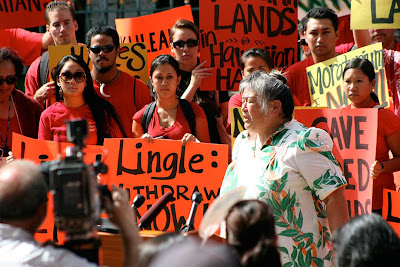When Saying "I'm Sorry" Really Means "Lakis Hao"
 Taitai hafa pinost yu' guini.
Taitai hafa pinost yu' guini.Para i mannatibu ni' sumusungon i "colonialism" ginnen i "mas maolek na nasion" hun, este i minagahet. Yanggen natibu hamyo, ya ma sakke' i tano'-miyu, i direchon-miyu yan kontodu i guinifen-miyu siha, ya i Amerikanu siha, ma sangani hamyo na "I'm sorry." Mismo kumekeilek-na "Lakis hao." Achokka' ma sangani hamyo "despensa ham," atan hafa i hiniyong yanggen en gaggao tatte i tano'-miyu pat un gaggao tatte para i direchon-miyu. Humuyongna este na na'ma'a'se na eskareng.
Para i mannatibu ginnen Hawai'i, hafa sina hu sangani hamyo put este iyo-ta colonizer, na ti esta en titingo' pat siesiente?
***********************************
Native Hawaiians Lose Claim
By JESS BRAVIN
Wall Street Journal
April 1, 2009
WASHINGTON -- A unanimous Supreme Court rejected native Hawaiians' claims that a congressional apology for an American-instigated 1893 coup should block the state government from selling public land until a property dispute is resolved.
The 12-page opinion, by Justice Samuel Alito, overturned a 93-page decision by the Hawaii Supreme Court. Last year, the Hawaii court found that the Apology Resolution recognized native Hawaiians' claim to lands taken from the toppled kingdom. The apology, made in 1993, acknowledged a conspiracy by American financiers, sugar planters and missionaries to overthrow the indigenous monarchy.
The U.S. Supreme Court found that the state justices had committed an error by reading the preamble of the congressional resolution as legally binding. The preamble included 37 "whereas" clauses detailing "the illegal overthrow of the Kingdom of Hawaii." Justice Alito wrote that the resolution had only two "substantive provisions," and neither one clouded the state government's ownership of the 1.2 million acres of public land at issue, 29% of the state's area.
Justice Alito said one of the two provisions -- an apology to native Hawaiians for depriving them of their rights to self-determination -- was "conciliatory" and didn't represent an effort by Congress to create substantive rights. In contrast, he observed, other congressional apologies for federal wrongs included specific remedies, such as $20,000 to each Japanese-American interned during World War II.
The second substantive provision stated that the resolution had no effect on claims against the federal government. The Hawaii court inferred that the resolution did recognize claims against the state government. Wrong again, Justice Alito wrote. A disclaimer of claims against one government couldn't be implicitly read as "an affirmative recognition of claims against another," he wrote.
The U.S. Supreme Court's decision isn't the end of the land dispute, which has roiled the Aloha State for decades. While the federal apology is now off the table, Hawaii state law has its own provisions for addressing indigenous peoples' claims, and those now are likely to take center stage when the case returns to the state courts.
Meanwhile, Altria Group Inc.'s Philip Morris unit lost a final chance Tuesday in the Supreme Court to overturn a $79.5 million punitive-damages ruling over an Oregon smoker's death. The high court dismissed the Philip Morris appeal without issuing an opinion, ending the third appeal the company had secured before the court.




Comments
________________________________
Research Paper Sample